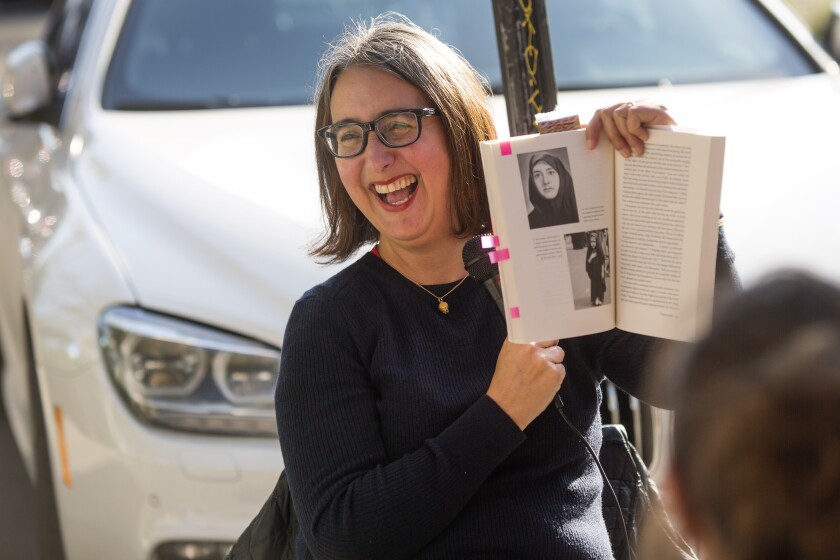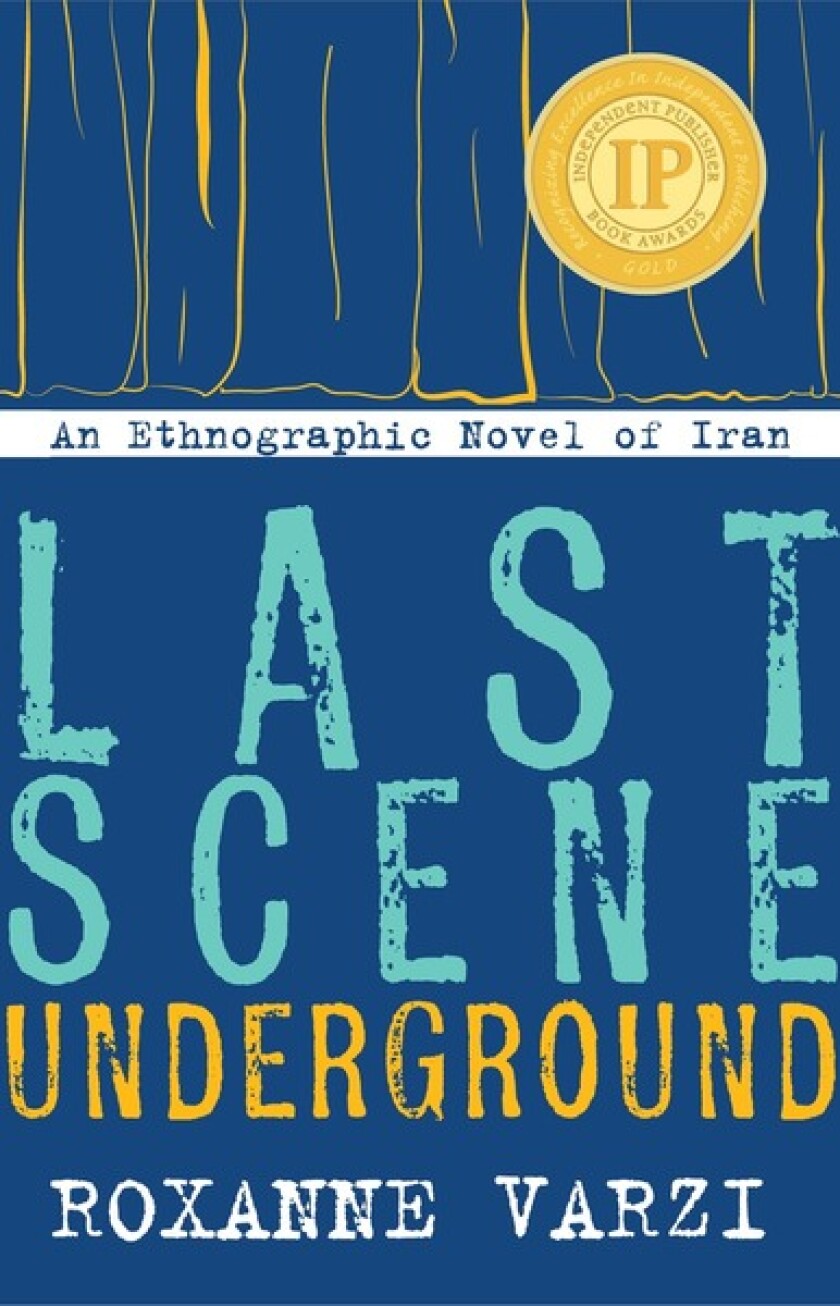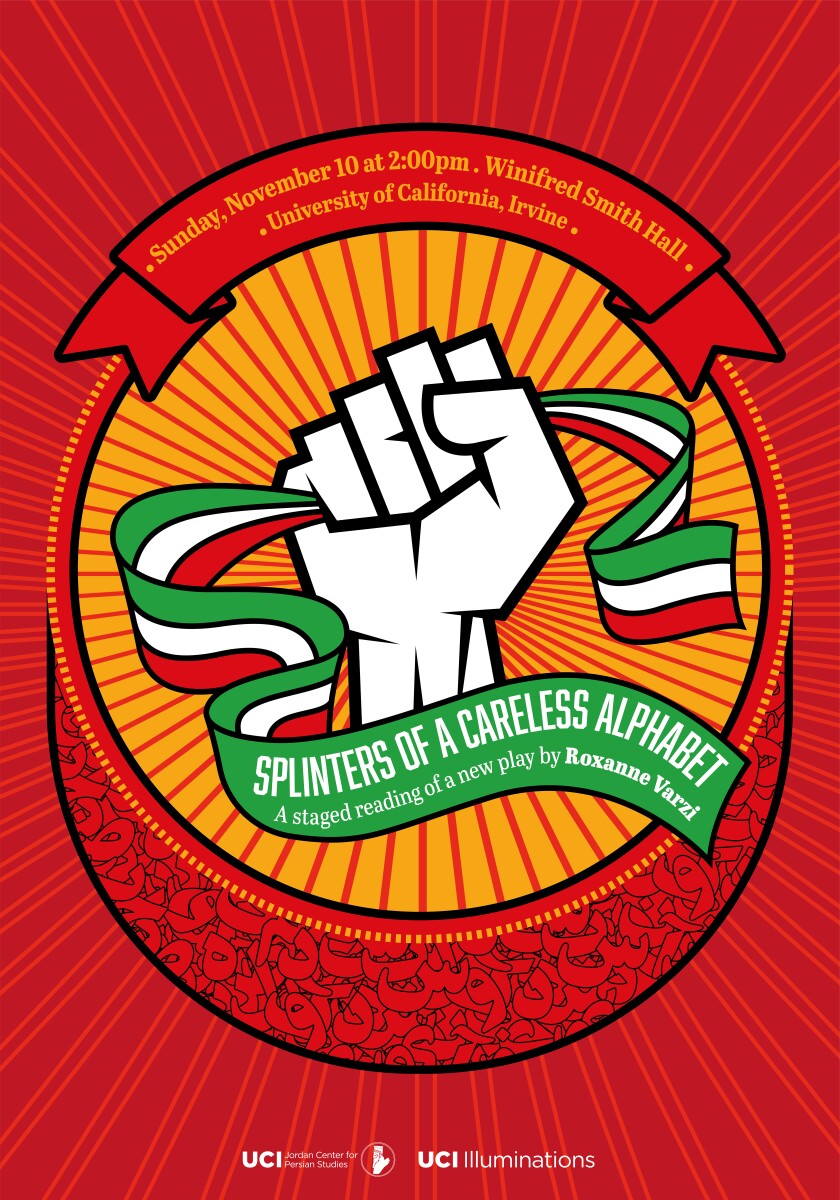It’s a recent warm winter afternoon in Orange County as a crowd gathers in the back alley near 4th and Spurgeon streets in Santa Ana — outside of the site of Libromobile, O.C.'s smallest bookstore — to listen to the guest speaker for the community event titled “No War on Iran!”
But Roxanne Varzi — a local writer, filmmaker, multimedia artist and UC Irvine professor of cultural anthropology — begins with a disclaimer: if anyone is expecting her to play the role of a political correspondent or explain yet another rising wave of Islamophobia in the U.S., it’s a good time to leave and check out the eateries nearby.
She has come to speak to her audience, first and foremost, as a storyteller and an artist.
She begins with her personal story.
Born in Iran to an Iranian father and an American mother, Varzi is both an American and Iranian citizen by birth. Though she was baptized and raised Catholic in a community of Irish missionaries in Tehran, she explains that by Islamic law, she is Muslim because her late father was Muslim.

In 1979, during the Iranian Revolution, she, then 8, moved to the U.S. with her American mother, leaving her father back in Iran.
For years after her move to the U.S., she downplayed her Iranian identity, scared every time Iran was in the news, because it meant she’d be bullied at school.
Varzi reads from her essay, “Am I an immigrant?,” published in the London Review of Books soon after President Trump signed his first Muslim Ban.
“Parents picked up their children in cars with bumper stickers that said ‘Bomb bomb bomb, bomb bomb Iran’ (to the tune of “Barbara Ann” by the Beach Boys). I hid my identity, to the degree that I could. I didn’t exactly fit into my Midwestern surroundings.”
Varzi tells her audience how she only started consciously embracing her Iranian identity during college in Washington D.C.
Sitting in her dorm lounge, she recalled watching American families being evacuated from Iraq during the first Gulf War. The children leaving their Middle Eastern fathers behind at a Middle Eastern airport in the middle of the night stirred something deep within her.
She decided to spend a year at the American University in Cairo, followed by a short visit to Tehran, before returning to the U.S. for a PhD in Anthropology and Iranian Studies.

It was during that first return to her “roots” that Varzi rediscovered a country bustling with an underground public and youth culture.
The culture in Tehran — no less vibrant than the cultural capitals of the Western world like New York, London or Paris, she emphasizes — became the focus of her ethnographic novel “Last Scene Underground," winner of the 2016 Independent Publishers Gold Medal.
She has also written the academic book, 2006’s “Warring Souls, Media, Martyrdom and Youth in post-Revolution Iran," and directed a couple documentaries, including 2009’s “Plastic Flowers Never Die,” about mourning and martyrdom in Iran, and 2018’s “Tehran Tourist,” which shows Iran through the eyes of her 3-year-old son.
She visited the country with him during the Obama presidency, which was a hopeful time when she saw Iran opening up to the world again.
“Tehran Tourist” walks its audience through some of Iran’s key cultural sites creating a “love letter to Tehran” with her iPhone 4.
Despite the documentary’s cultural and political relevance, Varzi confesses she’s had a hard time showing the film in Los Angeles, home to Hollywood and the largest Iranian diaspora.
She says that her documentary’s non-sensational content doesn’t fit the Western preference for films about Iran that highlight abuse, drug addiction and terrorism.
However, others’ preferences are not stopping Varzi from her work combating simplistic images of Iran with her own nuanced storytelling.

She’s currently working on a play called “Splinters of a Careless Alphabet,” where she shows the influence of Western philosophies on the 1979 Iranian Revolution, an uprising often considered in the West to be an Islamic movement. She’s in talks with Los Angeles’ Rogue Machine Theater to potentially develop it for their next season.
Like all her work, this play aims to undo the simplistic binaries of “East versus West” or “us versus them” — to show how cultures have seldom stayed pure entities, how they have always traveled and borrowed freely from each other.
And she hopes personal narratives like hers centered around the Middle East will make people understand what’s at stake with a potential war on Iran.
Comments